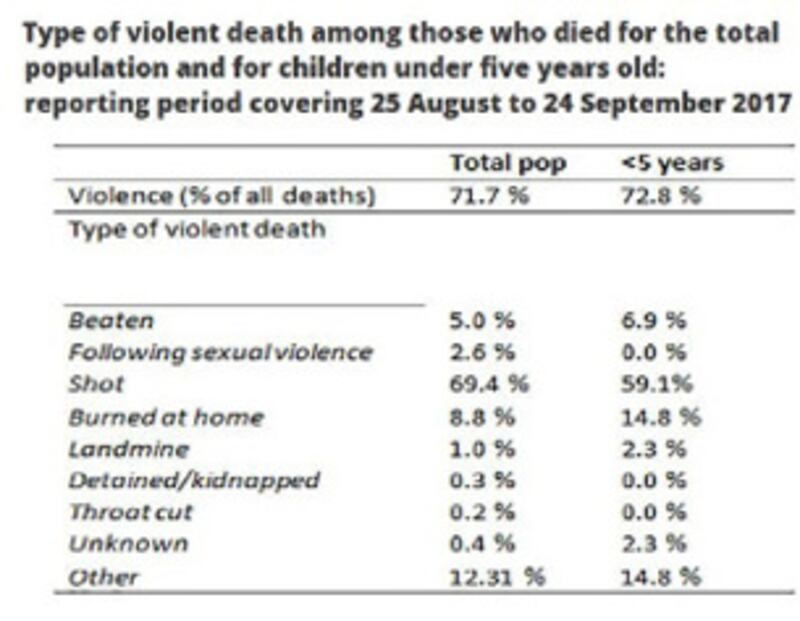At least 6,700 Rohingya Muslims were killed during the first month of a crackdown in Myanmar this year, Doctors Without Borders (MSF) said Thursday in a report based on surveys of refugees who fled to Bangladesh and that marks the highest death toll given to date.
The number of people who died in Myanmar’s Rakhine state from being shot, burned inside their homes, beaten and other grisly causes between Aug. 25 and Sept. 24 (see table) includes 730 children under age 5, according to MSF.
The combined number of Rohingya who died of violent or non-violent causes during that period was at least 9,000, but the overall death toll could be as high as nearly 14,000 people, the Geneva-headquartered international NGO said.
“We met and spoke with survivors of violence in Myanmar, who are now sheltering in overcrowded and unsanitary camps in Bangladesh. What we uncovered was staggering, both in terms of the numbers of people who reported a family member died as a result of violence, and the horrific ways in which they said they were killed or severely injured,” Sidney Wong, MSF’s medical director, said in a statement.
The findings from the surveys in southeastern Bangladesh “are the clearest indication yet” of widespread violence that began in Rakhine on Aug. 25 and show the Rohingya were targeted when the Myanmar military, police and local militia launched a crackdown in the state in late August, MSF said.
“The peak in deaths coincides with the launch of the latest ‘clearance operations’ by Myanmar security forces in the last week of August,” MSF reported.
The crackdown, which followed raids against Myanmar police and security posts by Arakan Rohingya Salvation Army (ARSA) insurgents on Aug. 25, pushed 655,000 members of the Rohingya Muslim minority to seek shelter in neighboring Bangladesh during the following months, according to the latest estimates published by the U.N. on Thursday.
“Currently people are still fleeing from Myanmar to Bangladesh and those who do manage to cross the border still report being subject to violence in recent weeks,” Wong said. “With very few independent aid groups able to access Maungdaw district in Rakhine, we fear for the fate of Rohingya people who are still there.”
The MSF report also pointed to victims being killed following sexual violence against them. Rape victims accounted for 2.6 percent of those killed.
Noor Hasina, a Rohingya refugee living in the Ukhia camp in Bangladesh’s Cox’s Bazar district, said her family had died in this manner.
“Myanmar soldiers killed my husband in front of my eyes. They took away my two young sisters who never returned. So far as I know, Myanmar soldiers raped and killed them,” she told BenarNews.

Likely underestimation
Both the United Nations and United States have branded the scale of violence in Rakhine as “ethnic cleansing.” Last week, the U.N.’s human rights chief, Seid Ra’ad Al Hussein told a U.N. Human Rights Council meeting that “elements of genocide” might be present.
Myanmar government officials have strongly denied the allegations and blamed ARSA rebels for the violence.
“The numbers of deaths are likely to be an underestimation as we have not surveyed all refugee settlements in Bangladesh and because the surveys don’t account for the families who never made it out of Myanmar,” Wong said. “We heard reports of entire families who perished after they were locked inside their homes, while they were set alight.”
The figure of 6,700 people who were killed through violence represents “the most conservative” estimate, MSF said.
During that one-month period, the mortality rate among Rohingya soared to eight deaths per 10,000 people.
For its report, MSF carried out six surveys in November at refugee camps and settlements in southeastern Bangladesh, during which the NGO interviewed 2,434 Rohinga households.
Myanmar reacts
As reported by MSF, the death toll from violence in Rakhine contrasts sharply with figures given by Myanmar officials who in early September put the death toll from the violence there in the low hundreds. At that time, only two weeks into the crackdown, a U.N. special rapporteur on human rights in Myanmar, Yanghee Lee, put the toll at around 1,000 or more dead.
“We don’t know what source MSF’s numbers are based on,” Win Myat Aye, Myanmar’s social welfare minister, told the Myanmar Service of Radio Free Asia (RFA), a sister entity of BenarNews, on Thursday.
“It is OK if military or police security officials who have been taking care of the problems in Rakhine State stated such numbers, or if the relevant administrative officials or relevant state government gave them. We can’t make any comment on that number, because MSF is only an I[nternational]NGO,” the minister added.
Myanmar’s elected civilian government has not been forthcoming with information about Rakhine, nor has it allowed independent monitors to access the state.
Jesmin Papri and Abdur Rahman in Dhaka contributed to this report.
